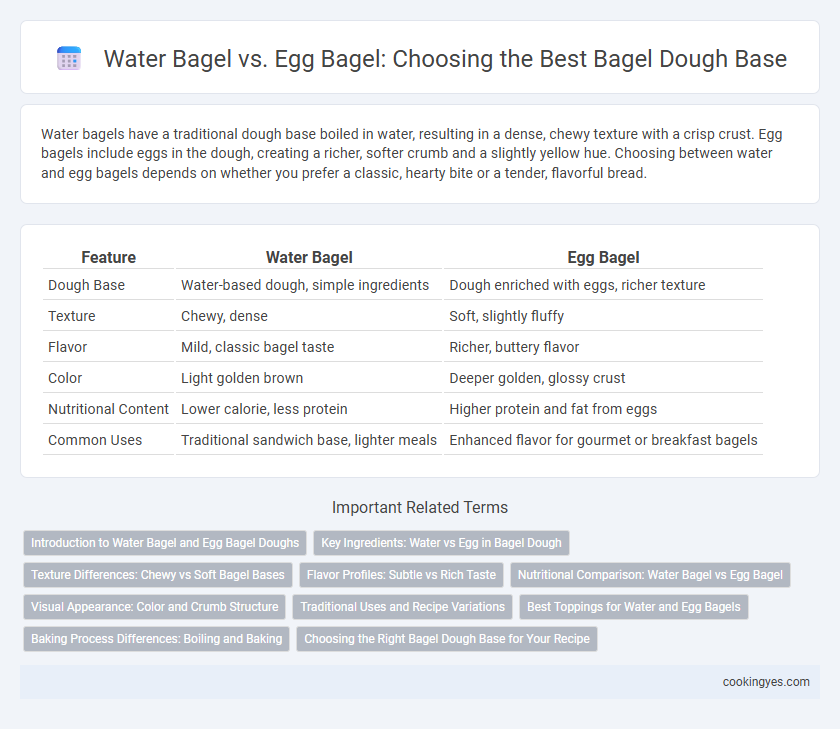Water bagels have a traditional dough base boiled in water, resulting in a dense, chewy texture with a crisp crust. Egg bagels include eggs in the dough, creating a richer, softer crumb and a slightly yellow hue. Choosing between water and egg bagels depends on whether you prefer a classic, hearty bite or a tender, flavorful bread.
Table of Comparison
| Feature | Water Bagel | Egg Bagel |
|---|---|---|
| Dough Base | Water-based dough, simple ingredients | Dough enriched with eggs, richer texture |
| Texture | Chewy, dense | Soft, slightly fluffy |
| Flavor | Mild, classic bagel taste | Richer, buttery flavor |
| Color | Light golden brown | Deeper golden, glossy crust |
| Nutritional Content | Lower calorie, less protein | Higher protein and fat from eggs |
| Common Uses | Traditional sandwich base, lighter meals | Enhanced flavor for gourmet or breakfast bagels |
Introduction to Water Bagel and Egg Bagel Doughs
Water bagel dough features a basic combination of flour, water, yeast, and salt, resulting in a chewy texture and a slightly crisp crust after boiling and baking. Egg bagel dough incorporates eggs, which add richness, a softer crumb, and a golden color, making the bagel slightly denser and more tender. The presence of eggs increases protein and fat content, contributing to a richer flavor profile compared to the more classic, neutral taste of water bagels.
Key Ingredients: Water vs Egg in Bagel Dough
Water bagel dough relies on water as the primary liquid, resulting in a chewier texture and a more traditional, subtle flavor profile. Egg bagel dough incorporates eggs, which enrich the dough with added fat and protein, producing a softer crumb and a slightly richer taste. The presence of eggs also lends a golden color to the crust and enhances the dough's elasticity, affecting the final texture and appearance of the bagel.
Texture Differences: Chewy vs Soft Bagel Bases
Water bagel dough creates a classic chewy texture due to the traditional boiling process, which tightens the gluten structure and forms a glossy crust. Egg bagel dough, enriched with eggs, results in a softer, more tender crumb and a slightly richer flavor, often yielding a less dense bite. The higher fat and protein content in eggs disrupts gluten formation, producing a delicate texture compared to the resilient chewiness of water bagels.
Flavor Profiles: Subtle vs Rich Taste
Water bagels offer a subtly chewy texture with a mild, clean flavor due to their dough base made primarily with water, highlighting the simplicity of traditional bagels. Egg bagels incorporate eggs into the dough, infusing a richer, slightly sweeter taste and a denser crumb, which complements savory toppings more robustly. The presence of egg proteins alters the Maillard reaction during baking, resulting in a deeper golden crust and enhanced flavor complexity compared to water bagels.
Nutritional Comparison: Water Bagel vs Egg Bagel
Water bagels and egg bagels differ significantly in their dough base, impacting their nutritional profiles. Water bagels, made primarily with flour, water, yeast, and salt, generally contain fewer calories, less fat, and lower cholesterol compared to egg bagels, which incorporate eggs and sometimes milk, increasing protein, fat, and cholesterol content. Choosing a water bagel offers a leaner option with lower saturated fats, while egg bagels provide extra nutrients like vitamin D and B12 but with higher calories and fats.
Visual Appearance: Color and Crumb Structure
Water bagels feature a pale, glossy crust with a dense, chewy crumb characterized by small, uniform air pockets. Egg bagels exhibit a richer golden-brown color due to the egg content, alongside a softer, more tender crumb with a slightly more open and airy structure. The visual contrast between the two highlights the denser, more uniform texture of water bagels versus the lighter, slightly fluffier appearance of egg bagels.
Traditional Uses and Recipe Variations
Water bagels use a simple dough base consisting of flour, water, yeast, and salt, resulting in a chewy texture ideal for classic recipes like New York-style bagels. Egg bagels incorporate eggs and sometimes sugar into the dough, yielding a richer flavor and softer crumb, often favored in Montreal-style bagels and sweet variations. Traditional uses emphasize water bagels for savory toppings, while egg bagels are commonly paired with sweeter spreads or used in sandwich-style preparations.
Best Toppings for Water and Egg Bagels
Water bagels have a chewier texture and denser crumb due to the lack of eggs in the dough, making them ideal for savory toppings like smoked salmon, capers, and cream cheese. Egg bagels, richer and softer from the added eggs, pair exceptionally well with sweet or creamy toppings such as honey butter, fruit preserves, or flavored cream cheeses. Both types accommodate classic sandwich fillings, but selecting toppings that complement the distinct texture enhances the overall bagel experience.
Baking Process Differences: Boiling and Baking
Water bagel dough typically contains only water, flour, yeast, and salt, resulting in a denser texture that requires precise boiling times to create a chewy crust. Egg bagel dough incorporates eggs, which increase moisture and fat content, altering the boiling process by producing a softer crust and slightly shorter boiling duration. During baking, water bagels develop a traditional glossy surface and firm chew, while egg bagels tend to brown more quickly and have a richer flavor due to the egg-enriched dough.
Choosing the Right Bagel Dough Base for Your Recipe
Water bagels feature a simple dough base boiled in water, which creates a chewy texture and classic bagel flavor ideal for traditional recipes. Egg bagels incorporate eggs into the dough, resulting in a richer, softer crumb and a slightly sweeter taste that works well for sandwich-style bagels. Selecting between water and egg bagel dough bases depends on whether a denser chew or tender crumb best complements your desired flavor profile and filling.
Water bagel vs egg bagel for dough base Infographic

 cookingyes.com
cookingyes.com